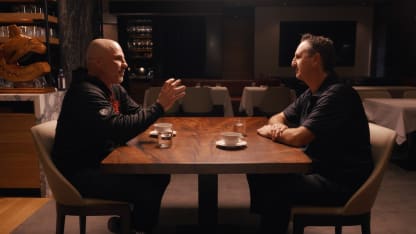What happens when you put a Jack Adams Award winner and a Les Bartley Award winner together at a table?
You get a conversation that inspires players, coaches and fans alike.
Vancouver Canucks’ Head Coach Rick Tocchet and Vancouver Warriors’ Head Coach and General Manager Curt Malawsky recently sat down to talk shop, comparing their coaching philosophies, how they’ve evolved in their approach to building winning teams, and yes – they even talked about practice.
Tocchet and Malawsky have similar philosophies which stem from the players they used to be. Both played a hard-nosed, old-school style. Tocchet tops the NHL rankings in Gordie Howe hat tricks throughout his career (18) and Malawsky was a 3.27 point-per-game forward, paying the price for his goals by doing most of his damage from the middle of the floor.
The two opened up about how they’ve evolved as coaches in the types of players they look for and building a winning program.
When they began their coaching careers, both Tocchet and Malawsky gravitated toward players who mirrored their own tough playing styles, confident that this approach would lead to success. Over time, they learned that winning requires adaptability – tailoring their systems to fit their players’ unique strengths rather than chasing a uniform identity across every position.
“I’ve adapted over the years,” said Tocchet. “Yes, you want tough players and guys that are going to play inside, but not everybody’s like you or like myself, and sometimes I’ve got to allow that player to be who he is. I’ve matured in letting a guy be who he is and not like ‘it’s got to be this kind of player all the time’”
“When I first started coaching, you come in and say ‘He’s soft, he can’t play’ and then you’re telling them how you want them to play and it’s not that easy in the NLL. You can’t always pick the guys for your system; you might have to adapt a little bit,” Malawsky said.
Getting the best out of their players is a skill they’ve learned throughout the years. The two coaches have learned it takes time to foster those relationships and help a player to be able to help them take the next step.
“You might not even know your players after six months, it’s going to take some time to know this player and how you coach him,” Tocchet said.
“Some are the whip and some are the sugar,” Malawsky said. “We have to help them succeed, otherwise they don’t succeed, our team doesn’t succeed, so it’s just about understanding how everybody works.”
Tocchet’s tenure in Arizona taught him valuable lessons about building a successful program. Instead of trying to tackle everything at once, he discovered that addressing challenges incrementally yielded more lasting and effective results.
Malawsky wanted to change the culture and made significant roster changes in the offseason before his first year with the Warriors to start to rebuild.



















